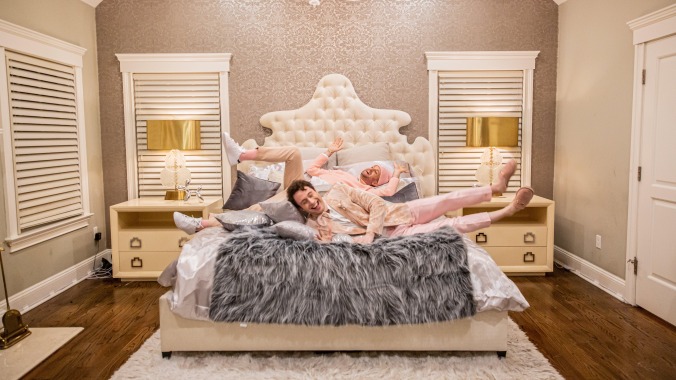This American Wife blends camp and confession by finding the “real” in Bravo’s Real Housewives

From the moment the doors of the mansion open, This American Wife dumps us in media res to the performance within the performance. Patrick Foley, Michael Breslin, and Jakeem Dante Powell don their most over-the-top, Real Housewives-appropriate outfits and immediately begin reenacting a few of the franchise’s most iconic scenes. Phaedra Parks. NeNe Leakes. Luann de Lesseps. Bethenny Frankel. LeeAnne Locken. Many of the women of Bravo’s long-running unscripted franchise are represented, and Foley, Breslin, and Powell deliver each of their lines perfectly and with the gusto and passion of a music lover in the front row of a rock show. The rapid fire dialogue and the rapidly shifting camera work provides a frenzied delivery that mirrors the passion of the characters and their love for the Housewives.
While sauntering his way down the mansion’s grand staircase, Powell—who, like Fake Friends founders and This American Wife writer-stars Foley and Breslin, is a Yale Drama School graduate—recites a quote from a 2014 episode of RHOA. “Honey, you don’t know if your baby daddy will be an axe murderer or child molester!” he says. Over in another, equally ostentatious, part of the house, we get Real Housewives Of Dallas star LeeAnne Locken’s “I didn’t grow up with a silver spoon in my mouth!” This American Wife was filmed on location on Long Island, and though each of the livestream performances (which ended their run on May 29—a video on-demand staging is available through June 6) changed a little bit each night, 80% of the dialogue is Real Housewives quotes. And the trio, much like their reality show idols, spend the evening fighting, feuding, and airing out their dirty laundry in luxury.
However, This American Wife isn’t all fannish enthusiasm with no substance. No. The “realest” moments of the show actually happen when the characters cut out the Housewives dialogue and speak honestly about their non-fandom lives. Each cast member picks up the camera and—after some verbal prodding—starts sharing. “I want to open you up,” Patrick tells Michael while behind the camera. He then asks Michael what his favorite Housewives house is, and though it seems like a pretty innocuous question at first, it’s actually a jumping off point. Viewers learn that in his youth Michael struggled with absentee parents, feelings of neglect, and he even used to force himself to do chores as a way to gain control and stability in his life.
When Patrick and Jakeem get their chance in front of the camera, they get “opened up” in a similar way. “Who’s your fave Housewife?” Michael asks Jakeem. “What kind of porn do you watch?” Jakeem asks Patrick.













![HBO teases new Euphoria, Larry David, and much more in 2026 sizzle reel [Updated]](https://img.pastemagazine.com/wp-content/avuploads/2025/12/12100344/MixCollage-12-Dec-2025-09-56-AM-9137.jpg)


























